Rooftop solar plans may stifle industry
Under a draft to encourage the development of rooftop solar power installation in Vietnam in June, the Ministry of Industry and Trade (MoIT) set up structures to encourage rooftop solar energy to be installed in homes, offices, and business headquarters in Vietnam. The power generated will be for self-consumption, not sale.
In addition, organisations and individuals investing in developing rooftop solar systems are exempted from electricity licences and certificates of electricity enterprise registration. Rooftop solar systems installed at offices are prioritised to allocate the budget for implementation.
But Dao Xuan Duc, chairman of the HEPZA Businesses Association, said that the draft did not refer to roofs of factories in industrial zones (IZs), at a workshop earlier this month.
“It would be a huge waste to ignore solar rooftops in IZs,” Duc said. “In Ho Chi Minh City alone, there are 18 IZs with a planned area of about 7,000 hectares, which will be increased by another 4,000ha going forward. The demand for electricity is absolutely huge.”
Textiles, garments, and footwear are among Vietnam’s billion-dollar export industries, and fields that have begun to turn green, but businesses are struggling with investing in rooftop solar power systems at factories because there is no clear support mechanism. Pham Xuan Hong, chairman of the board at Saigon 3 Garment JSC, said that the policies for solar power were still unclear because there was no mechanism to support installation costs such as capital, tax, and fee reductions.
One renewables investor said last week, “It is incomprehensible why the MoIT doesn’t mention IZs when talking about the rooftop solar power development strategy. The benefits from rooftop solar power in such facilities are great – for the state, for Electricity of Vietnam (EVN), for electricity buyers, and for electricity generators, especially when the north is suffering from electricity shortages.”
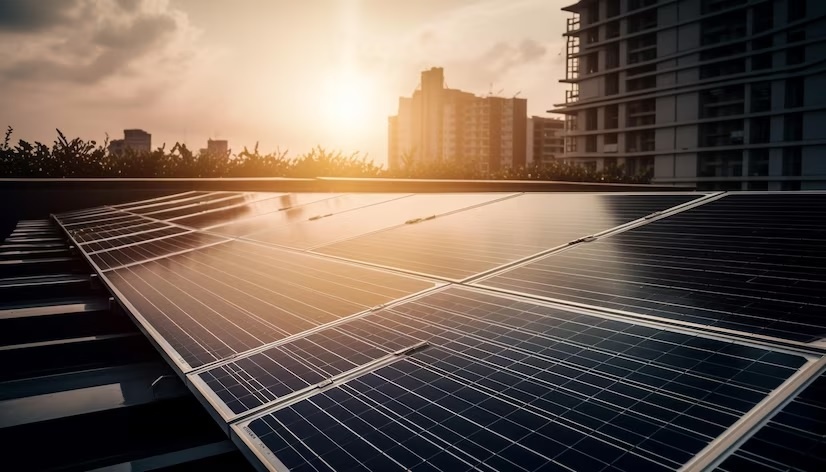 |
| Rooftop solar plans may stifle industry, illustration photo/ Source: freepik.com |
Weak encouragement?
To encourage rooftop solar power development, various ministries seek to expand the scope of rooftop solar power systems to schools, hospitals, farms, production workshops, airports, railways stations, seaports, and others.
But the MoIT said it is following the instruction of Deputy Prime Minister Tran Hong Ha that the players at this time are homes and office buildings, while others will be looked at in future decisions.
Analysts pointed out that the draft document compiled by the MoIT mentions “encouragement”, but there is nothing which encourages rooftop solar power to develop in reality. The mechanisms in the document are deemed vague.
Le Chi Hieu from the Ho Chi Minh City University of Technology said he agrees with the self-production and self-consumption principle when developing rooftop solar power stated in the Power Development Plan VIII (PDP8), but stressed that if there is no detailed regulation, the strategy will fail.
“If we only think of developing rooftop solar on people’s homes and office buildings, nothing will be solved. If we want to develop the national electricity system, we have to think about developing rooftop solar power systems in IZs,” Hieu said.
Businesses that invest in solar power on the roofs of IZ factories to resell also are concerned about developing solar power in the near future.
“The mechanism proposed by the MoIT indeed only applies to the roof voltage system in office buildings, and is not yet applied to factories, so capacity is very limited and cannot meet the demand for clean electricity for large-scale factories,” said Nguyen Hoai Nam, deputy general secretary of the Vietnam Association of Seafood Exporters and Producers.
In a response, the MoIT explained that development in these areas had not been prioritised immediately, as they needed to be considered and calculated based on development of other sources in the entire power structure. This is to exploit the distributed renewable energy source without having to invest in upgrading the distribution grid, and especially to ensure the safe operation of the whole system.
In recent times, foreign-invested enterprises have expressed desire to participate in using renewable energy sources for production. Samsung, for example, proposed a trial programme to purchase power directly from renewable power plants instead of from EVN.
Potential agreements
Some companies with major brands in the country have been working towards carbon neutrality with roof-based strategies.
Honda Vietnam set the goal of reducing CO2 by 46 per cent compared to 2019 by 2030, and it wants to be carbon-neutral by 2050. Earlier this year, the company put into operation a roof voltage system at factories in the northern provinces of Vinh Phuc and Ha Nam, contributing to reducing the use of national electricity by more than 7.5 million kWh per year and equivalent to a cut of about 4,700 tonnes of CO2 per year.
The company has said that the aforementioned solar power output accounts for about 6 per cent of Honda Vietnam’s demand, and it is considering the efficiency of buying solar directly from production units through a direct power purchase agreement between renewable energy generators and customers.
According to the PDP8, by 2030, half of all commercial buildings and half of all residential buildings will employ self-sufficient and self-consuming rooftop solar power. But the MoIT also acknowledged that since 2021, the installation of rooftop solar power in the country took place spontaneously and was not controlled.
“The most important thing now is to review the status of rooftop solar power installations after 2020 to get an overall picture before continuing to propose a new mechanism,” said Nguyen Binh, an industry expert.
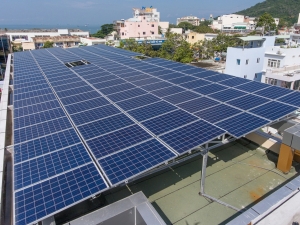 | MoIT aims to incentivise private solar energy for home and office The Ministry of Industry and Trade (MoIT) has submitted to the government a draft mechanism that promotes the growth of rooftop solar power installed in homes and offices for private-use. Rooftop solar power for private use will be exempt from certain business and operation licences, and may be eligible for interest rate, tax, and fee incentives. |
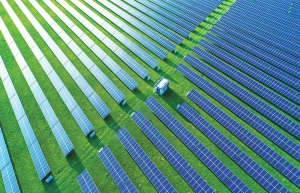 | Solar solutions bring best-in-class quality Businesses are eager to install rooftop solar assets to generate green energy for their self-consumption, which is encouraged by Vietnam’s approved power scheme. |
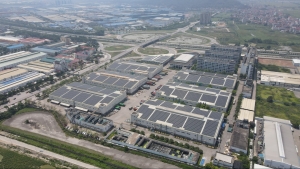 | FIEs in Vietnam promote green energy growth With recent power shortages stemming from increased seasonal demand, along with the growing appetite for electricity from commercial and residential developments, the need for a more reliable power supply has made Vietnam an attractive market for foreign investors to develop rooftop solar energy. This has been led by Vietnam's foreign-invested enterprises (FIEs) in the manufacturing sector, particularly the electronics, semiconductor, and textile industries |
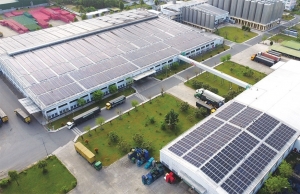 | SABECO lights path for green change Faced with the impacts of climate change, raising awareness about recycling and prioritising products using renewable energy is one of the key factors in the operation of Saigon Beer-Alcohol-Beverage Corporation. |
What the stars mean:
★ Poor ★ ★ Promising ★★★ Good ★★★★ Very good ★★★★★ Exceptional
Related Contents
Latest News
More News
- Trung Nam-Sideros River consortium wins bid for LNG venture (January 30, 2026 | 11:16)
- Vietnam moves towards market-based fuel management with E10 rollout (January 30, 2026 | 11:10)
- Envision Energy, REE Group partner on 128MW wind projects (January 30, 2026 | 10:58)
- Vingroup consults on carbon credits for electric vehicle charging network (January 28, 2026 | 11:04)
- Bac Ai Pumped Storage Hydropower Plant to enter peak construction phase (January 27, 2026 | 08:00)
- ASEAN could scale up sustainable aviation fuel by 2050 (January 24, 2026 | 10:19)
- 64,000 hectares of sea allocated for offshore wind surveys (January 22, 2026 | 20:23)
- EVN secures financing for Quang Trach II LNG power plant (January 17, 2026 | 15:55)
- PC1 teams up with DENZAI on regional wind projects (January 16, 2026 | 21:18)
- Innovation and ESG practices drive green transition in the digital era (January 16, 2026 | 16:51)

 Tag:
Tag:




















 Mobile Version
Mobile Version